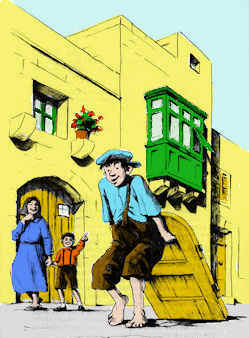The predominant anti-hero in Maltese folk narrative is
Ġaħan. He is the wise fool, popular with one and all in contemporary
Malta. He is the epitome of Maltese verbal wisdom and humor. The subjective and
definite coloring of Ġaħan’s anecdotes is imbued with typical
Mediterranean narrators’ humor, which often takes the form of a negative
tendency. But it is a tendency that springs from the inclination and will to
laugh at oneself and the world at large, an ironical bent toward contradiction
and debunking. Humor is not only a device to uphold interest in the tale. It
also facilitates the comprehension of the progression of events, thus
heightening effectiveness and efficiency of the narration.
Due to lack of scientific fieldwork research, many in
Malta openly declare and write in their “desk analyses” that Ġaħan
is dead, thus giving no attention to ethnic or native analysis, framing him as a
“light-headed” fool and his anecdotes, brimming with sagacity, slyness,
guiles, cheats and deceits, have been defined as stupidities by a Maltese
academic. There has been a historical undercurrent since the first half of the
twentieth century that, through children’s literature, has manipulated and
bowdlerized the discursive richness of Maltese folk culture on Ġaħan.
It is the aim of this paper to show how through my research and publications I
strongly disagree with this pseudo-scientific assertion that has been
crystallized in Maltese, the native language of the Maltese archipelago.
